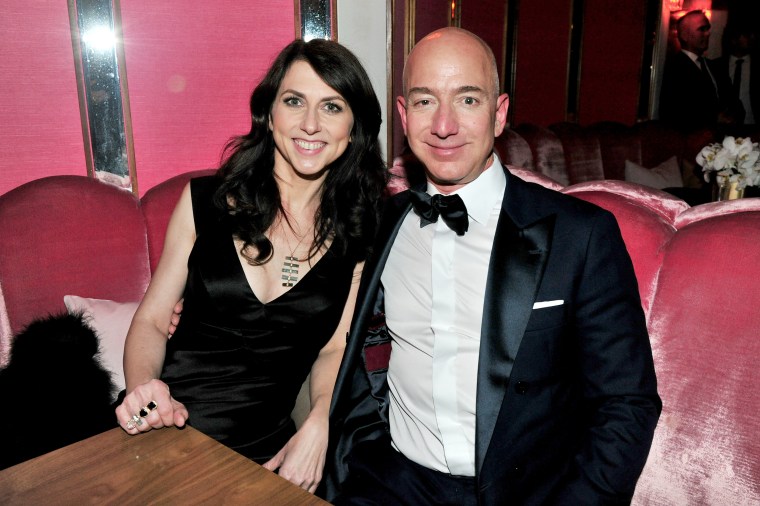As a result of her recent divorce from Amazon founder Jeff Bezos, MacKenzie Bezos is one of the richest women in the world — with a net worth of $37 billion. This week, she joined The Giving Pledge, an exclusive club of billionaires founded by Warren Buffett and Bill Gates who’ve promised to give away at least half of their wealth.
With her pledge, Bezos is set to become one of America’s biggest philanthropists. But she’s stepping into the role at a moment when there’s growing scrutiny of wealthy donors and how they’re using tax-deductible dollars.
So far, Bezos hasn’t offered many details about how her philanthropy will play out.
To fulfill her pledge, Bezos will need to give away at least several billion dollars a year — a sum that would make her the top philanthropist in the U.S., after Bill and Melinda Gates.
For one thing, we still don’t know exactly how much of her money she’s going to give away. While members of The Giving Pledge commit to giving away at least half their wealth, many plan to give much more. When you’re talking about people with net worth in the tens of billions of dollars, these details matter.
Bezos has said about her giving that she will keep at it “until the safe is empty.” In recent years, though, most members of The Giving Pledge have accumulated wealth faster than they’ve given it away. To fulfill her promise, Bezos will need to give away at least several billion dollars a year — a sum that would make her the top philanthropist in the U.S., after Bill and Melinda Gates. On the other hand, she could decide to donate much of her wealth to a foundation that exists in perpetuity, like the Ford and Rockefeller foundations.
Want more articles like this? Sign up here for the THINK newsletter to get weekly essays and analysis
Given her vast wealth, wherever Bezos does decide to give her money will be a big deal. While she didn’t offer details about the causes she’ll support in this week’s announcement, she and her former husband Jeff have previously given money for early childhood education, homelessness, cancer research and programs for undocumented immigrant youth.
Philanthropy is often — but not always — political, and it remains to be seen whether Bezos will back aggressive efforts to sway public policy, following the lead of other philanthropists like George Soros on the left and the Koch brothers on the right. The growing use of charitable funds to influence issues like guns, climate change and tax policy has raised questions about whether such giving needs to be better regulated, along with other forms of money in politics. If Bezos uses her vast Amazon fortune to engage in controversial giving, that could increase calls for more oversight of philanthropy.
Likewise, how Bezos organizes her philanthropy is important. Mark Zuckerberg and Priscilla Chan drew heavy criticism a few years ago when they announced they would do their giving through a limited liability corporation (LLC). Unlike private foundations, which must release tax forms every year showing where grants are going, LLCs generally do not have public reporting requirements. This structure has allowed some major philanthropists, like Laurene Powell Jobs, to operate with minimal transparency.
Bezos may have good reasons to opt for an LLC to manage her giving, since these flexible entities can also invest in for-profit enterprises and make political donations. But if she takes that route, as one of the biggest new philanthropists in the world, it’s likely to fan more fears that the super rich are wielding influence in secretive ways using “dark money.”
Dark money is in the news a lot right now because of its perceived influence on elections. But so is the relationship between the uber-rich and taxes, which has a lot to do with the philanthropy system. By devoting her wealth to philanthropy, as opposed to eventually paying estate taxes on the original total, Bezos will deprive the U.S. Treasury of billions of dollars in revenue — at a time when rising entitlement costs are likely to force federal budget cuts in many areas.
The public might reasonably ask whether this lost revenue will be well spent and whether taxpayers are getting a good deal. Unfortunately, though, there is no way to answer these questions.
The public might reasonably ask whether this lost revenue will be well spent and whether taxpayers are getting a good deal. Unfortunately, though, there is no way to answer these questions. While proponents of the charitable tax deduction say that it underwrites a large nonprofit sector that improves U.S. life in myriad ways, critics say that only a small portion of donated wealth actually reaches the neediest Americans. And as the scholar Rob Reich points out in his recent book, “Just Giving,” many gifts go to elite academic and cultural institutions favored by the wealthy.
MacKenzie Bezos is doing the right thing by pledging to give away most of her Amazon fortune. But she’s joining the ranks of big league philanthropists at a moment of growing skepticism about these givers — and the system that enables their outsize largesse.
And how a new mega-giver like Bezos conducts herself — whether she operates secretly or transparently, spends wisely or frivolously or throws her weight around politically — will affect how the public sees philanthropy.

